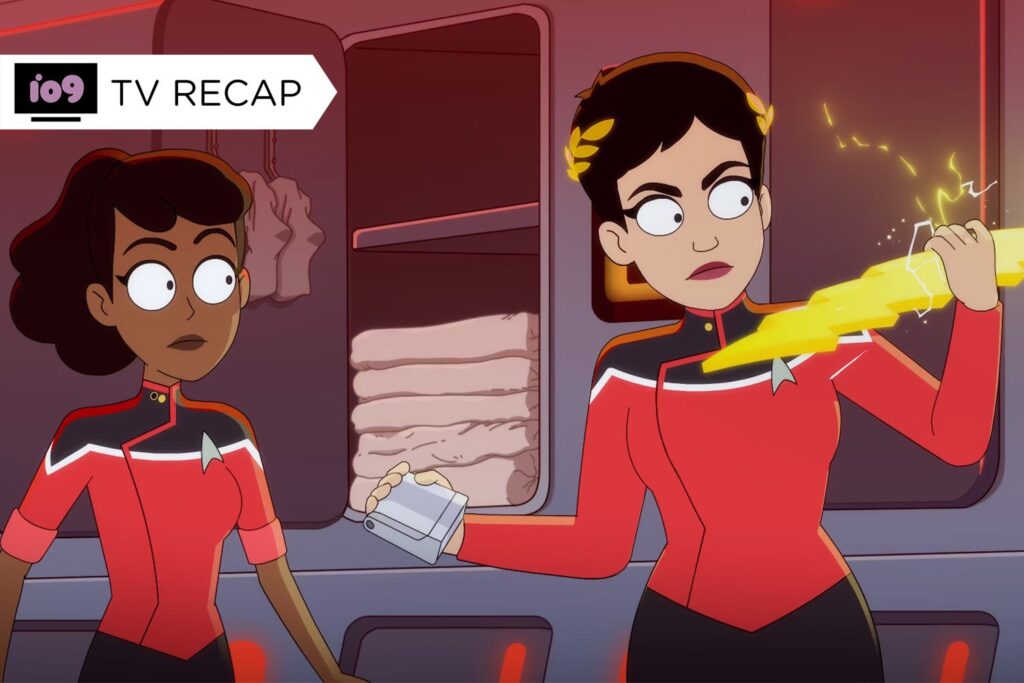Star Trek: Lower Decks‘ final season has unified itself around a singular thematic message as it prepares to say goodbye, around how its ever-learning, ever-growing heroes still need to remember to be open and honest with each other to be their very best. It’s a good theme to build the show’s last season around, but more than halfway in, it’s largely meant we’ve gotten a series of episodes all built around similar premises resolved the same way. But before we quite get to the annoyance of these lessons being repeated rather than just re-learned, this week’s episode at least expands on the theme in some interesting ways.
“Of Gods and Angles” sees Mariner take a new, unruly ensign under her wing at fraught time for the Cerritos. While playing host to peace talks for warring photonic races (one spherical, one cuboid, because what does Star Trek love if not a simplified abstract concept?), tensions between the factions reach a fever pitch when the son of one of the cuboid diplomats goes missing. Which is a serious enough Star Trek plot, but this is Lower Decks, so the wrench that gets thrown in the works is that Mariner’s new project is attempting to rescue an unruly Ensign Olly, a demigod—in the vein of the alien-greek-gods from the original series classic “Who Mourns for Adonais?”—with several chips on her shoulder.
There’s good reason Mariner is eager to take on Olly as a redemptive challenge, while Ransom and Captain Freeman (turns out they’re completely fine from their bat encounter last week!) are quick to push her off the Cerritos and potentially out of Starfleet altogether. There’s a kinship Mariner sees with where Olly is at: brash, quick to try and prove herself capable regardless of how she’s been told to do something, headstrong but impulsive in just the right ways to bristle any authority figure. That is, essentially, how we were introduced to Mariner all those years ago, but unlike Mariner, Olly is not the protagonist of a TV show: she doesn’t have the time to exist and go on the long arc of growth, so for the most part, as excited as Mariner is to help someone go on the journey she’s already been on, she largely has to exist in this episode to make you go “oh right, this kind of character is really annoying when your heroes just need to get things done.”
It’s a fun inversion of a frustration we’ve usually seen play out between the senior Cerritos officers and our lower deckers over the years, and a nice way to really underline to audiences just how much Mariner has changed over the course of the show. It’s been a long arc, and she still in many ways retains a lot of that anti-authority brashness, but having Olly be there and behaving so much like Mariner’s old self shows you just how much those aspects of her have softened as she’s matured and embraced the person she always wanted to be. It’s also really beneficial because, ultimately, this is the sixth episode of the season preparing to have the same thematic lesson play out for the sixth time in a row—Olly ends up complicating the matters with the Cubes and Orbs to all-out-war again largely because she was afraid of saying something to Mariner that could’ve resolved the bulk of the episode two acts early. Having those lessons need to be resolved and taken on by a character that isn’t one of our main quartet at least freshen things up.
It’s also a fun contrast with the b-plot of the episode, in which Boimler, steadily more bearded and more obsessed with his alt-universe self’s padd with every episode, strives to strike up a friendship with the irascible Dr T’Ana like alt-Boimler did. Of course, things don’t go anywhere even remotely like he’d expect them to, but by the end of the episode (and one brief surgery to remove one of Olly’s lightning bolts out of Boimler’s behind), the two have a more amicable understanding of each other. But! This time it’s not because Boimler was subjected the season’s lesson of being open and communicative, but instead jokingly rejecting it—and getting Rutherford to join in by the end—when he embraces copying alt-Boimler’s padd to glean his personality, rather than just being who he really is. It’s played for a laugh, but it’s actually nice to see one of heroes fail to take on the intent of this thematic lesson in one of these episodes if we’re going to keep musing on the theme, because it then actually becomes important to remind the audience that these are not one-and-done character moments. Growth and self-reflection, aboard the Cerritos or otherwise, requires constant openness to learning and taking onboard things you’ve already confronted in your journey!
That said, time is running out for Lower Decks to actually do more with this thematic idea than simply repeat it over and over. “Of Gods and Angles” grants the series a stay of execution on the repetition becoming an issue by reflecting it on characters outside of our key quartet, and by inverting it in some fun ways, but as we really begin to head into Lower Decks‘ end, the next few weeks need to pick up on more interesting ways to play with this theme… before it fails to take on that lesson itself.
Want more io9 news? Check out when to expect the latest Marvel, Star Wars, and Star Trek releases, what’s next for the DC Universe on film and TV, and everything you need to know about the future of Doctor Who.


